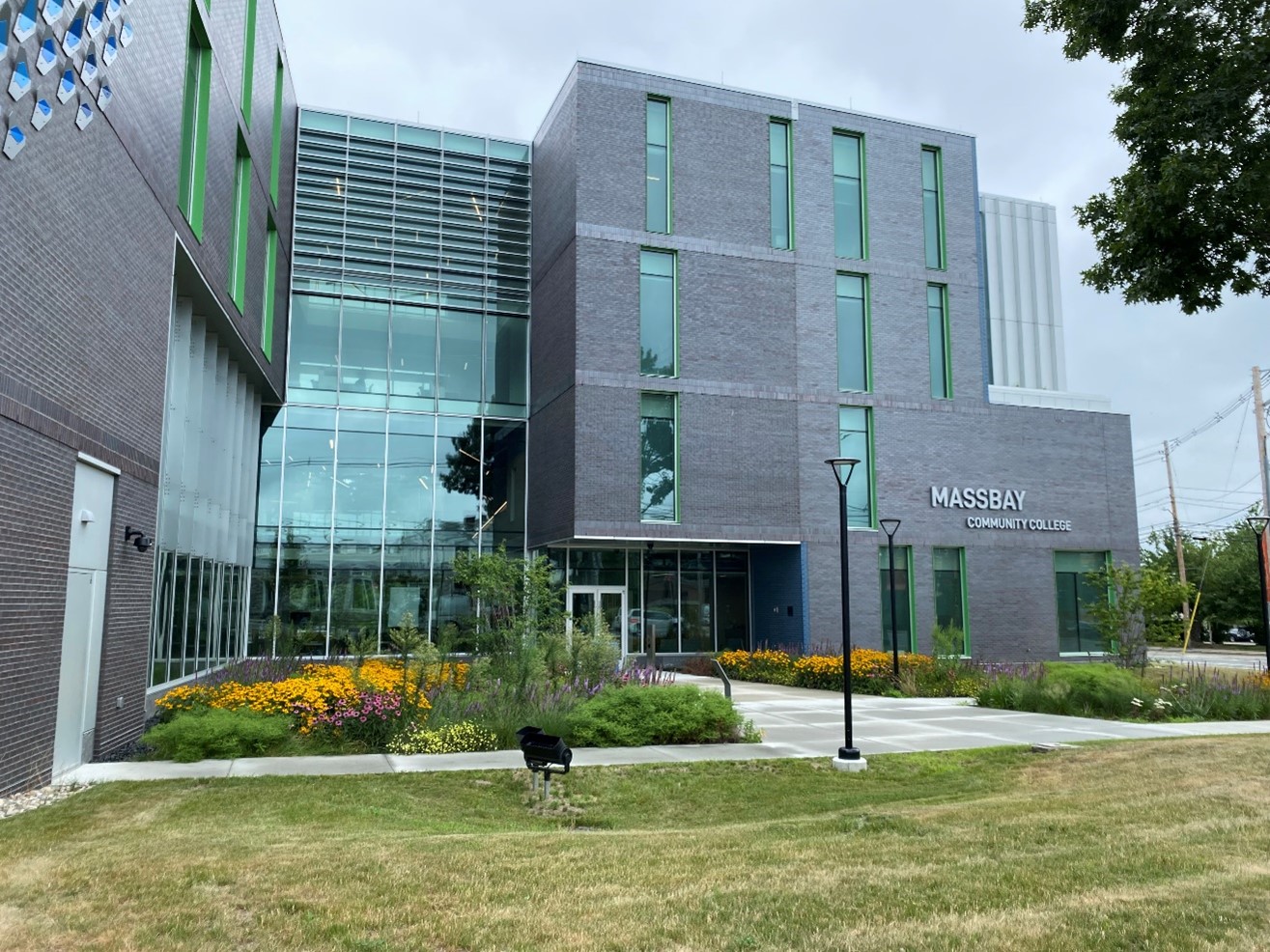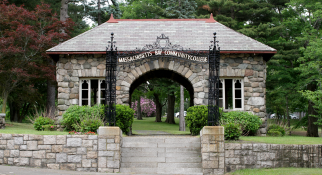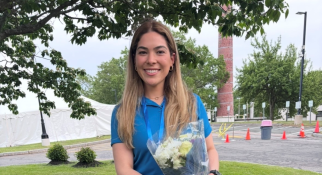Article • June 02, 2025

MassBay Community College Center for Health Sciences, Early Childhood, and Human Services welcomed students on January 22, 2024, in Framingham. This was the first building ever constructed for MassBay, since its founding in 1961, as all other buildings have been retrofitted to meet program needs, Framingham, MA, April 2024 (Photo/MassBay Community College).
FOR IMMEDIATE RELEASE
Contact:
Liz Cooper
ecooper@massbay.edu
FRAMINGHAM, Mass. (June 2, 2025) — MassBay Community College has been awarded the LEED Gold certification for its Framingham campus building located at 490 Franklin Street. LEED (Leadership in Energy and Environmental Design), developed by the U.S. Green Building Council (USGBC), is the most widely used green building rating system in the world and an international symbol of excellence. Through design, construction and operations practices that improve environmental and human health, LEED-certified buildings are helping to make the world more sustainable.
“MassBay Framingham stands as a beacon of progress, innovation, and sustainability,” said MassBay Community College President David Podell. “This dynamic community facility houses the space, equipment, and technology needed to prepare generations of students for the jobs of today and of the future in needed health care, educational, and human service professions. The LEED Gold certification is an affirmation of MassBay's commitment to care and serve the MetroWest community. We are grateful to Governor Maura Healey, Senate President Karen Spilka, and our donors and supporters who made this remarkable building possible, and to the talented architects and construction professionals who designed and built it.”
MassBay Framingham was constructed by Lee Kennedy, Co. of Quincy, MA, overseen by the Massachusetts Division of Capital Asset Management and Maintenance. The lead architect was Sasaki Associates, Inc. of Boston, MA in collaboration with Studio ENEE of Boston.
MassBay achieved LEED Gold certification for implementing practical and measurable strategies and solutions in sustainable site development, water savings, energy efficiency, materials selection, and indoor environmental quality.
The building design provides for the conservation of energy and water, and the facility generates as much energy as it consumes each year. Throughout the campus, green placards detail the interior and external environmental features, which include:
- Solar panel canopy in theparking lot, with additional solar panels on the roof to convert sunlight into electrical energy. Over a year, the panels can produce as much energy as the building consumes.
- Almost 95% of the steel frame of the building is recycled materials, as are many of the aluminum window frames.
- The flooring throughout the building is biodegradable and made from natural and renewable materials such as linseed oil, flax, pulverized wood, jute, and cork dust, and the drywall includes recycled content.
- No materials, glues, and coatings that discharge harmful chemicals into the indoor environment were ever used.
- Below the 426 parking spaces in the parking lot, 36 geo-wells extend 500 feet into the ground, where the earth is at a steady temperature year-round. In the heating season, the round-source heat pump loop exchanges heat with the warmer earth. When the temperature rises and cooling is needed, the loop transfers heat from the building into the cooler ground.
- The building walls contain multiple layers of mineral-fiber insulation and have been tested for air-tightness.
- The windows have three layers of glass to let light in while protecting the interior from summer heat and winter cold.
- The patterns printed on the glass and metal louvers attached to the windows help protect from glare, while allowing in daylight.
- A vacancy sensor controls the light-enclosed rooms. In spaces unoccupied for 15 minutes, the lights will shut off. In areas with significant daylight contribution, a photosensor on the ceiling controls the amount of synthetic light.
- Electric vehicle charging stations are installed in the parking lot, with conduit and capacity for additional stations to be installed as demand rises.
- Rainwater runoff from the roof and paved surfaces is filtered and cleaned by plants and soils in the stormwater garden. Rather than rainwater running into the Sudbury River or the Framingham storm drains, the garden recharges the water table and prevents flooding.
Certification is proof that buildings are going above and beyond to ensure the space is constructed and operated to the highest level of sustainability. More than 129,000 commercial and institutional projects are currently participating in LEED, comprising more than 12 billion square feet of construction space in all 50 states and more than 186 countries and territories.
“MassBay’s LEED Gold certification demonstrates tremendous green building leadership,” said Peter Templeton, president and CEO, USGBC. “LEED was created to make the world a better place and revolutionize our buildings and communities by providing everyone with access to healthy, green and high performing buildings. MassBay is a prime example of how the innovative work of project teams can create local solutions that contribute to making a global difference.”
The MassBay Framingham campus houses courses in Health Sciences, Early Childhood Education, Human Services, as well as many general education classes.
MassBay Community College is the most affordable higher education option in MetroWest Boston and is free to most Massachusetts residents without a bachelor’s degree. With more than 70 associate degree and certificate programs, along with comprehensive workforce and educational training, MassBay provides a wide range of courses with flexible day, evening, and weekend classes in Wellesley, Framingham, the Automotive Technology Center in Ashland, and online, in high-demand fields including health and life sciences, computer science, engineering, cybersecurity, business, and the humanities. MassBay students receive unparalleled value, with free one-on-one academic and social support services, compassionate and experienced faculty, and stackable credits that easily transfer to bachelor’s degree programs and that provide hands-on, workforce-ready skills. Health sciences, human services, early childhood education, and many general education programs are offered at the 65,000 square foot, state-of-the-art MassBay Framingham, which has served the community since January 2024. Founded in 1961, MassBay has been accredited by multiple governing bodies and remains dedicated to serving its diverse communities, fostering inclusiveness, and advancing equity for all.
About the U.S. Green Building Council (USGBC) The U.S. Green Building Council (USGBC) is committed to transforming how buildings and communities are designed, built and operated to create thriving, healthy, equitable and resilient places that advance human and environmental wellbeing. USGBC leads market transformation through its LEED green building program, robust educational offerings, an international network of local community leaders, the annual Greenbuild International Conference & Expo, the Center for Green Schools, and advocacy in support of public policy that encourages and enables green buildings and communities. For more information, visit usgbc.org and connect on X (formerly Twitter), Instagram, Facebook, and LinkedIn.


